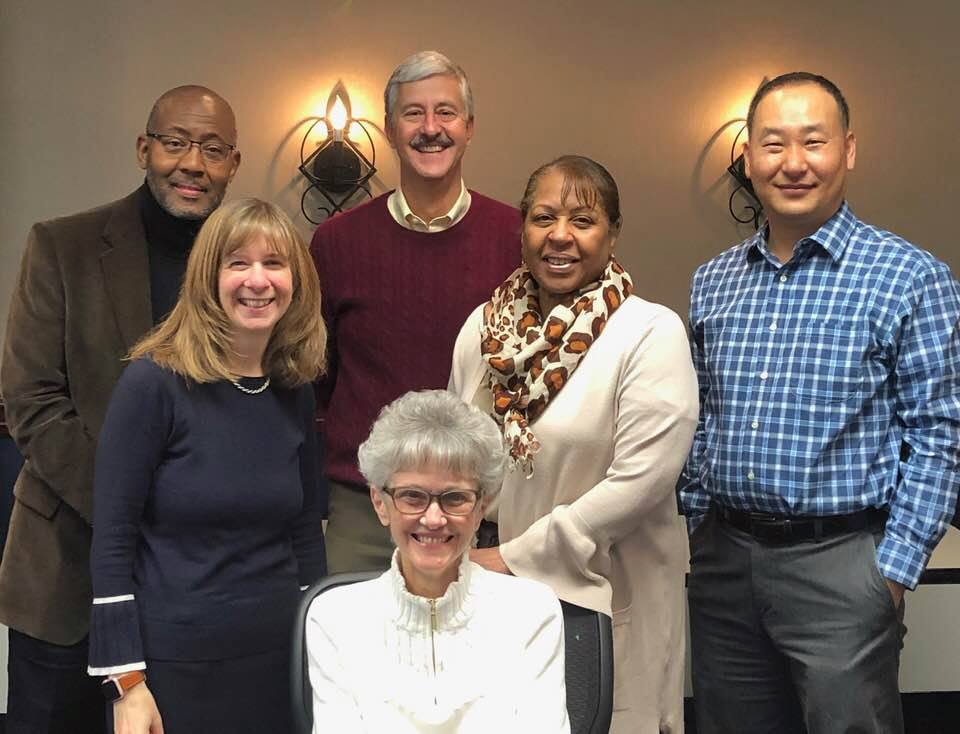
By John W. Coleman
Bishop Peggy Johnson and the Eastern PA Conference Cabinet took turns explaining their Pandemic Reopening Best Practices for Churches document in a Zoom webinar Tuesday evening, May 12. Participation reached the maximum allowed at 500 viewers. A recording of the webinar is now available on the conference’s website and YouTube page. And a supplemental Q&A document, with answers to questions asked during the program, is also available.
Cabinet members walked viewers through the best practices resource to help congregations seeking to rebound from extended church closures caused by the COVID-19 pandemic and to return to onsite worship and ministry. Joining them for a major part of that discourse was Conference Chancellor Matt Morley.

The Rev. Steve Morton, North District Superintendent, covered protocols for Pennsylvania Gov. Tom Wolf’s “red phase” of pandemic mitigation, which requires most, non-life-sustaining establishments to remain closed and most people to remain at home unless they must venture out. “We’re thrilled that churches are doing a great job with creative, effective, online worship,” said Morton. “Please continue to do that.”
He has visited pastors during their Sunday worship webcasts using livestream video, where they had few worship participants onsite, wore protective masks and practiced safe-distancing. “It’s been a especially tough time for conducting life rituals—funerals and weddings,” said Morton, who has conducted a funeral himself with only nine other people present.
He also reported that Northumberland County, in the northwest corner of his district, is among the first yellow-phase counties in the state allowed to reopen some businesses and services but still with restrictions, including a 25-person limit in occupancy. Several of that district’s churches cautiously had onsite worship on Sunday and others are planning to do so by June.
The Rev. Dawn Taylor-Storm, South District Superintendent, reviewed guidelines for churches moving into the yellow phase of mitigation protocols. She cautioned churches to follow official mandates and guidelines issued by the governor and public health officials, and by their counties and municipalities.
Difficult changes ahead
“Church leaders should be meeting now to discern when and how to reopen during the yellow phase or if they will wait till the green phase,” said Taylor-Storm. She cited guidelines in the document that pertained to church protocols for worship, communion elements, child care centers, teleworking by staff, contingency plans for visitors and many other aspects of church life that will change radically and likely for some time to come.
One change likely to be difficult is limiting singing by congregations and choirs. “That can be very risky with COVID-19 infections,” she warned. “Our Methodist hearts are heavy, but we must recommend no singing.” Also, no touching or coming close to one another during passing of the peace, no sharing of hymnals and Bibles, no reuse of bulletins, and no passing the offering plate from person to person. Tape or other markers and ropes should be used on pews and floors to prevent proximity between worshipers. No more coffee hours or fellowship gatherings—or use safe distancing when they do occur. No youth mission trips this summer and no children gathering at the altar to hear children’s sermons.
“Leadership teams should get ready to implement new policies, so the responsibility doesn’t fall only on the pastor,” Taylor-Storm, said.
“The green phase is the least restrictive but still not business as usual,” announced the Rev. Tracy Bass, East District Superintendent. While pointing out that “aggressive mitigation measures” would be lifted in that phase, he advised continued caution to avoid crowds, maintain sanitation protocols and stay aware of warnings and recommendations from the district and conference and from state and local public health agencies.

Conference Chancellor Matt Morley (right) addressed at length some legal rights and restrictions, questions and considerations not covered in the Reopening Best Practices document. “This is an incredibly fast-developing area of law,” he acknowledged, citing a lot of diverse opinions among attorneys. He encouraged churches to consult experienced attorneys in their congregations for help.
A key area of concern is liability and insurance coverage. “We don’t know for sure if insurance policies will cover lawsuits if someone contracts COVID-19 in a church,” Morley said. He mentioned U.S. Senate Majority Leader Mitch McConnell’s plan to push for blanket immunity for businesses.
Liability, insurance coverage concerns
“For now, we think there is a possibility—even a likelihood,” Morley said, “that if churches are not careful they could face negligence actions, based on their failure to properly protect congregations and visitors.” He explained two likely problem areas: proving causation and proving “a breach in the standard of care.”
“You have to think about what if multiple people in your congregation contract COVID-19 in a similar timeline. That would be a strong case for a plaintiff’s attorney.” In response to a frequent question he gets, Morley said this disease is more deadly than the flu, and thus, churches must take more seriously their obligation to protect themselves from civil liability suits.
He advocated for liability waivers but cautioned that there are “big limits” in their effectiveness. “They only cover negligence but not gross negligence or recklessness. Also, they are not valid against minors. You really need to understand their limits.”
The conference attorney admonished all churches to follow the recommendations of their state, county and municipal governments, as well as relevant licensing authorities; and if there is any conflict among them, then follow “the most stringent guidelines.”
Morley addressed the claim by leaders of Lancaster, Lebanon and Schuylkill counties that they want to move themselves into the yellow phase of mitigation protocols even though the governor has not yet moved them into that phase. Gov. Wolf’s order has been upheld by the state Supreme Court and must be obeyed, Morley said. So even though their local police and district attorneys have said they will not arrest and prosecute violators, “that does not mean you’re protected from a liability perspective. If I was the (plaintiffs’) attorney I would show as evidence of negligence that you were not following legal guidelines.”
Churches have rights to prevent infection
Morley further explained that churches, as private property, may restrict who enters and also take temperatures of members and guests to help determine if they have a possible COVID-19 infection. They can also request contact information in case someone needs to be notified later of possible exposure to the virus. But churches must be careful to not publicly disclose personal contact or health information.
Moreover, churches may ask employees to sign and comply with a COVID-19 prevention code of conduct, promising to avoid risk-taking behaviors. Churches may also employ facility use agreements to require that proper safety and hygiene procedures are followed by other churches, agencies or groups using their buildings, including as election polling stations for voters.
Morley said he would create and provide four legal documents for churches to use as they prepare to reopen:
- A liability waiver for groups using church facilities
- An employee code of conduct form
- A use agreement contract addendum for outside entities using church facilities
- A use agreement contract addendum for use of the church as a polling place.
Bishop’s views on Holy Communion
Bishop Johnson responded to a question about churches celebrating Holy Communion online during the pandemic, a trend that has revived a long-running controversy among church leaders, theologians and seminary educators.
“I have allowed online communion as an exception to our normal practice because this is a difficult time in the life of churches that requires extraordinary measures,” the bishop responded. “My sense is that it gives comfort and the presence of Christ to people and should be allowed.”
She acknowledged disagreement among her episcopal peers but also recommended the non-sacramental Wesleyan Love Feast as an alternative to communion.
She further cautioned churches about offering drive-in and drive-through communion where members remain in their cars and either use elements they brought from home or elements given to them through their car windows.
“You can’t be handing cups and bread through open car windows and making contact,” she warned. “And I’m definitely not in favor of offering (poured) grape juice once we’re all back together for worship again. There’s just no way of getting that right, unless you have the individual wrapped cups of juice with wafers on top. Those are probably the safest. Any other way is too dangerous.”
Instead, Bishop Johnson advised churches to serve only bread, carefully with tongs, and not serve juice. “It’s not the way we’re used to having communion, but during these tough times we have to take health measures first and foremost. This will all be over someday, someway; but we have to put health first and know that the presence of Christ is in the breaking of the bread.”
The Rev. Anita Powell, Director of Connectional Ministries, collected questions and comments sent in and relayed them to the panelists for their responses. Without enough time to answer many of the questions in detail, the Cabinet and Morley prepared answers later and have provided them in the post-seminar Q & A resource document.
